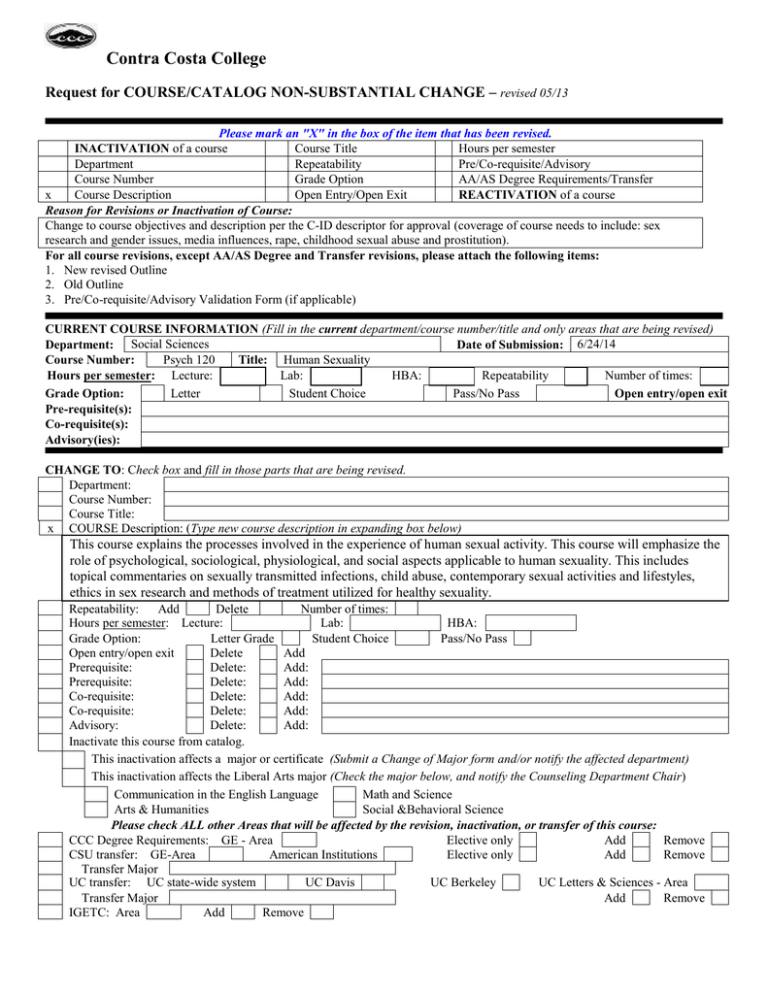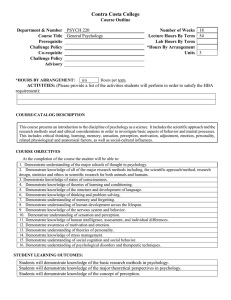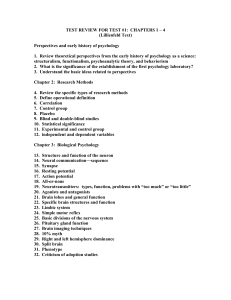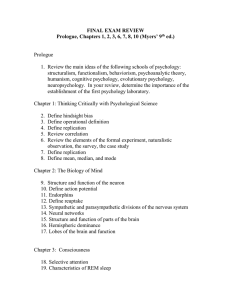PSYCH 120 Non Substantial Change-Arnold.doc 178KB Sep 08 2014 09:35:38 AM
advertisement

Contra Costa College Request for COURSE/CATALOG NON-SUBSTANTIAL CHANGE – revised 05/13 Please mark an "X" in the box of the item that has been revised. Course Title Hours per semester INACTIVATION of a course Department Repeatability Pre/Co-requisite/Advisory Course Number Grade Option AA/AS Degree Requirements/Transfer x Course Description Open Entry/Open Exit REACTIVATION of a course Reason for Revisions or Inactivation of Course: Change to course objectives and description per the C-ID descriptor for approval (coverage of course needs to include: sex research and gender issues, media influences, rape, childhood sexual abuse and prostitution). For all course revisions, except AA/AS Degree and Transfer revisions, please attach the following items: 1. New revised Outline 2. Old Outline 3. Pre/Co-requisite/Advisory Validation Form (if applicable) CURRENT COURSE INFORMATION (Fill in the current department/course number/title and only areas that are being revised) Department: Social Sciences Date of Submission: 6/24/14 Psych 120 Course Number: Title: Human Sexuality Lab: HBA: Repeatability Number of times: Hours per semester: Lecture: Letter Student Choice Pass/No Pass Grade Option: Open entry/open exit Pre-requisite(s): Co-requisite(s): Advisory(ies): CHANGE TO: Check box and fill in those parts that are being revised. Department: Course Number: Course Title: x COURSE Description: (Type new course description in expanding box below) This course explains the processes involved in the experience of human sexual activity. This course will emphasize the role of psychological, sociological, physiological, and social aspects applicable to human sexuality. This includes topical commentaries on sexually transmitted infections, child abuse, contemporary sexual activities and lifestyles, ethics in sex research and methods of treatment utilized for healthy sexuality. Repeatability: Add Delete Number of times: Hours per semester: Lecture: Lab: HBA: Grade Option: Letter Grade Student Choice Pass/No Pass Open entry/open exit Delete Add Prerequisite: Delete: Add: Prerequisite: Delete: Add: Co-requisite: Delete: Add: Co-requisite: Delete: Add: Advisory: Delete: Add: Inactivate this course from catalog. This inactivation affects a major or certificate (Submit a Change of Major form and/or notify the affected department) This inactivation affects the Liberal Arts major (Check the major below, and notify the Counseling Department Chair) Communication in the English Language Math and Science Arts & Humanities Social &Behavioral Science Please check ALL other Areas that will be affected by the revision, inactivation, or transfer of this course: CCC Degree Requirements: GE - Area Elective only Add Remove CSU transfer: GE-Area American Institutions Elective only Add Remove Transfer Major UC transfer: UC state-wide system UC Davis UC Berkeley UC Letters & Sciences - Area (specify) Transfer Major Add Remove IGETC: Add Remove (specify) Area APPROVAL SIGNATURES (Please Print Name/Signature) Faculty Originator Department Chair: DIC Chair: Division Dean: CIC Chair: VP of Instruction or designee: Distribution: Michel B. Arnold Michel B. Arnold Dr. J. Vern Cromartie Dr. J. Vern Cromartie Dr. Donna Floyd Gabriela Segade Tammeil Gilkerson Date: Date: 6/24/14 Date: Date: Date: Date: Instruction Office (original), Articulation Office, Admissions and Records Office, Faculty Originator, Department Chair, and Division Office Contra Costa College Course Outline Department & Number Social Sciences PSYCH 220 Course Title General Psychology Prerequisite Challenge Policy Co-requisite Challenge Policy Advisory *HOURS BY ARRANGEMENT: n/a Number of Weeks 18 Lecture Hours By Term 54 Lab Hours By Term *Hours By Arrangement Units 3 Hours per term. ACTIVITIES: (Please provide a list of the activities students will perform in order to satisfy the HBA requirement): COURSE/CATALOG DESCRIPTION This course presents an introduction to the discipline of psychology as a science. It includes the scientific approach and the research methods used and ethical considerations in order to investigate basic aspects of behavior and mental processes. This includes critical thinking, learning, memory, sensation, perception, motivation, adjustment, emotion, personality, related physiological and anatomical factors, as well as social-cultural influences. COURSE OBJECTIVES At the completion of the course the student will be able to: 1. Demonstrate understanding of the major schools of thought in psychology. 2. Demonstrate knowledge of all of the major research methods including, the scientific approach/method, research design, statistics and ethics in scientific research for both animals and humans. 3. Demonstrate knowledge of states of consciousness. 4. Demonstrate knowledge of theories of learning and conditioning. 5. Demonstrate knowledge of the structure and development of language. 6. Demonstrate knowledge of thinking and problem solving. 7. Demonstrate understanding of memory and forgetting. 8. Demonstrate understanding of human development across the lifespan. 9. Demonstrate knowledge of the nervous system and behavior. 10. Demonstrate understanding of sensation and perception. 11. Demonstrate knowledge of human intelligence, assessment, and individual differences. 12. Demonstrate awareness of motivation and emotion. 13. Demonstrate understanding of theories of personality. 14. Demonstrate knowledge of stress management. 15. Demonstrate understanding of social cognition and social behavior. 16. Demonstrate understanding of psychological disorders and therapeutic techniques. STUDENT LEARNING OUTCOMES: Students will demonstrate knowledge of the basic research methods in psychology. Students will demonstrate knowledge of the major theoretical perspectives in psychology. Students will demonstrate knowledge of the concept of perception. COURSE CONTENT (Lecture): Background—psychology as a science, history, schools of thought, research methods, the scientific method and ethics in scientific research with animals and humans. States of consciousness: sleep and dreaming, hypnosis, and psychoactive drugs. Adaptive behavior: classical conditioning, operant conditioning, and observational learning. Language and cognition: learning, thinking, and problem solving. Memory and forgetting: processing, meaningfulness, and organization. Developmental psychology: biological, motor, intellectual, social change, and life stages. Physiology and perception: nervous system, sensation, and perception. Motivation and emotion: drives, feelings, and motives. Personality: theories. Personality assessment and individual differences: instruments, methods, and evaluation. Stress management: sources, consequences, and coping. Social psychology: social perception and social influence. Pathology and treatment: scope, disorders, and therapy. COURSE CONTENT (Lab): METHODS OF INSTRUCTION Lecture and discussion (e.g., large groups and small groups) Multimedia (D2L) Online course elements including but not limited to course management software (Wiley Plus) Videos and films, quizzes Required readings INSTRUCTIONAL MATERIALS: NOTE: To be UC/CSU transferable, the text must be dated within the last 7 years OR a statement of justification for a text beyond the last 7 years must be included. Textbook Title: Author: Publisher: Edition/Date: Textbook Reading Level: Justification Statement: Psychology in Action Huffman Wiley Publishing 2012 College Level N/A OUTSIDE OF CLASS WEEKLY ASSIGNMENTS: Title 5, section 55002.5 establishes that a range of 48 -54hours of lecture, study, or lab work is required for one unit of credit. For each hour of lecture, students should be required to spend an additional two hours of study outside of class to earn one unit of credit. State mandates that sample assignments must be included on the Course Outline of Record. Outside of Class Weekly Assignments Hours per week Weekly Reading Assignments (Include detailed assignment below, if applicable) 2 Assigned reading every week covering pertinent materials related to critical thinking in psychology Weekly Writing Assignments (Include detailed assignment below, if applicable) 2 Journal Article review on Primary Psychological Source or Scientific Study that has been conducted within the past few years. See attached for assignment. Weekly Math Problems (Include detailed assignment below, if applicable) Lab or Software Application Assignments (Include detailed assignment below, if applicable) Other Performance Assignments (Include detailed assignment below, if applicable) 2 Wiley Plus assignments and videos and video quizzes and lectures on additional material related to the course objectives and SLO’s STUDENT EVALUATION: (Show percentage breakdown for evaluation instruments) 33 33 34 % % % % Midterm Final exam Journal Article Review/ Quizzes/ Wiley Plus Assignments GRADING POLICY (Choose LG, P/NP, or SC) x Letter Grade Pass / No Pass 90% - 100% = A 80% - 89% = B 70% - 79% = C 60% - 69% = D Below 60% = F 70% and above = Pass Below 70% = No Pass Prepared by: Michel Arnold, MS Date: 3/19/14 Revised 10/13 Student Choice 90% - 100% = A 80% - 89% = B 70% - 79% = C 60% - 69% = D Below 60% = F or 70% and above = Pass Below 70% = No Pass Contra Costa College Course Outline Department &Number Psychology 220 Course Title General Psychology Prerequisite None Co-requisite Challenge Policy Advisory Number of Weeks 18 Lecture Hours 54 Lab Hours Hours By Arrangement Activity Hours Units 3 COURSE/CATALOG DESCRIPTION This course presents an introduction to the discipline of psychology as a science. It includes the scientific approach to such basic aspects of behavior as growth, thinking, learning, memory, sensation, perception, motivation, adjustment, emotion, personality, related physiological and anatomical factors, as well as socialcultural influences. Not repeatable. COURSE OBJECTIVE At the completion of the course the student will be able to: dedemonstrate demonstrate: 1. Demonstrate awareness of the major schools of thought in psychology, the most popular theorists, and the most commonly used research methods. 2. Demonstrate awareness of states of consciousness. 3. Demonstrate awareness of theories of learning and conditioning. 4. Demonstrate awareness of the structure and development of language. 5. Demonstrate awareness of thinking and problem solving. 6. Demonstrate awareness of memory and forgetting. 7. Demonstrate awareness of human development across the lifespan. 8. Demonstrate awareness of the nervous system and behavior. 9. Demonstrate awareness of sensation and perception. 10. Demonstrate awareness of human intelligence, assessment, and individual differences. 11. Demonstrate awareness of motivation and emotion. 12. Demonstrate awareness of theories of personality. 13. Demonstrate awareness of stress management. 14. Demonstrate awareness of social cognition and social behavior. 15. Demonstrate awareness of psychological disorders and therapeutic techniques. COURSE CONTENT: (In detail; attach additional information as needed and include percentage breakdown) 5 % Background—psychology as a science, history, schools of thought, methods, goals, and definitions. 5 10 10 5 10 10 5 10 5 % States of consciousness: sleep and dreaming, hypnosis, and psychoactive drugs. % Adaptive behavior: classical conditioning, operant conditioning, and observational learning. % Language and cognition: learning, thinking, and problem solving. % Memory and forgetting: processing, meaningfulness, and organization. % Developmental psychology: biological, motor, intellectual, social change, and life stages. % Physiology and perception: nervous system, sensation, and perception. % Motivation and emotion: drives, feelings, and motives. % Personality: theories. % Personality assessment and individual differences: instruments, methods, and evaluation. % Stress management: sources, consequences, and coping. % Social psychology: social perception and social influence. % Pathology and treatment: scope, disorders, and therapy. 5 10 10 METHODS OF INSTRUCTION Lecture and discussion (e.g., large groups and small groups) Multi media Online course elements including but not limited to course management software Telecourse videos and films Required readings INSTRUCTIONAL MATERIALS Textbook Title: Author: Publisher: Edition/Date: Psychology Ciccarelli & White Pearson 2nd Edition 2009 COURSE EXPECTATIONS (Use applicable expectations) Outside of Class Weekly Assignments Hours per week Weekly Reading Assignments 2 Weekly Writing Assignments 2 Weekly Math Problems Lab or Software Application Assignments Other Performance Assignments 2 STUDENT EVALUATION: (Show percentage breakdown for evaluation instruments) 33 33 34 % % % % Midterm Examination Final Examination Reaction papers and/or term papers GRADING POLICY (Choose LG, CR/NC, or SC) X Letter Grade 90% - 100% = A 80% - 89% = B 70% - 79% = C 60% - 69% = D Below 60% = F Credit / No Credit 70% and above = Credit Below 70% = No Credit Student Choice 90% - 100% = A 80% - 89% = B 70% - 79% = C 60% - 69% = D Below 60% = F or 70% and above = Credit Below 70% = No Credit Prepared by: Course New/Revision Date: Course Effective Date: Revised 11/07 Michel B. Arnold March 2010 Fall 2010




